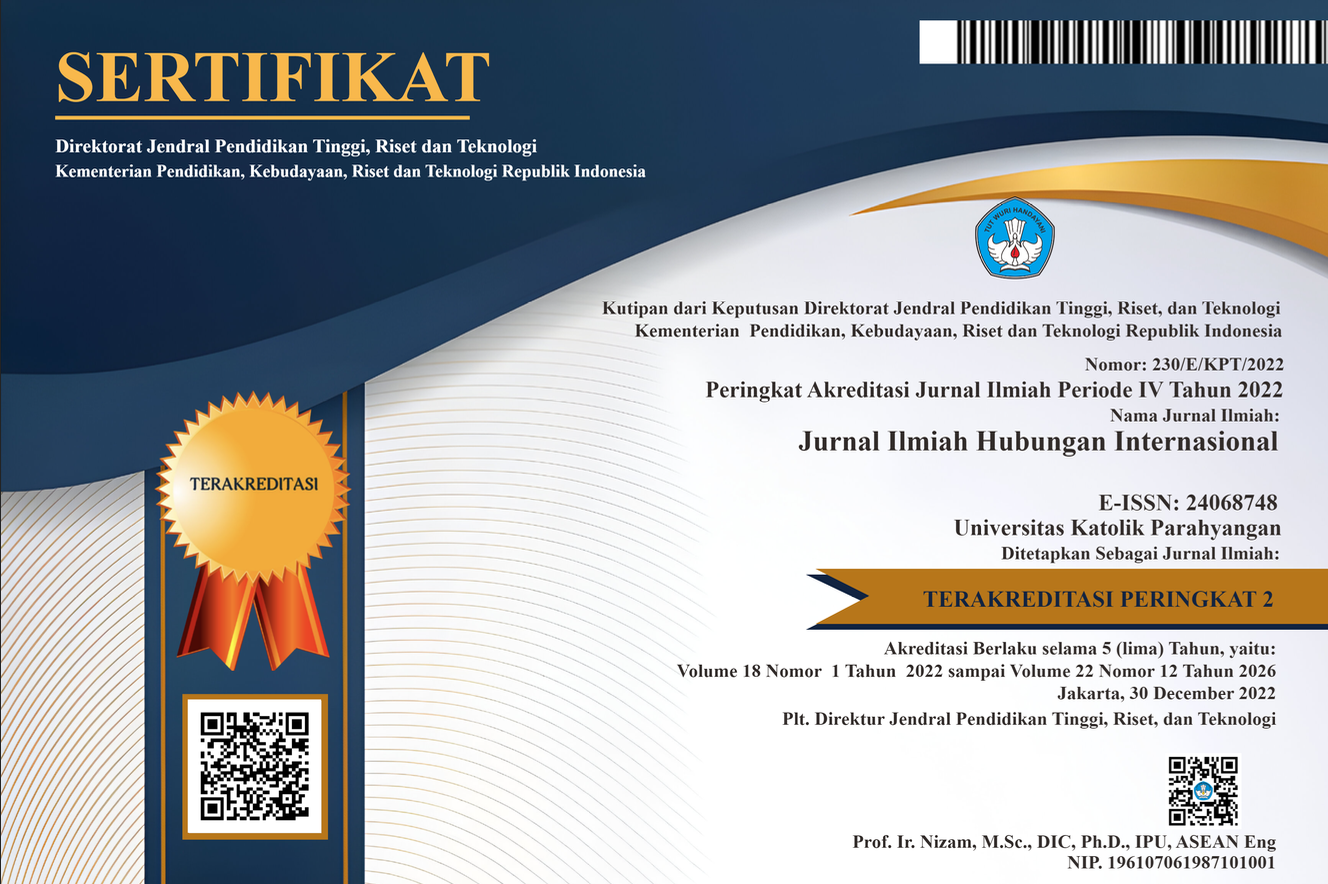Ketergantungan Negara terhadap Pasar Internasional dalam Mencapai Ketahanan Pangan (Dengan fokus perbandingan negara Indonesia dengan Vietnam, Malaysia, dan Amerika Serikat)
DOI:
https://doi.org/10.26593/jihi.v16i2.3478.227-241Keywords:
International Political Economy, Food SecurityAbstract
Food security become very important as food crisis occurred in 2008. Under the administration of Susilo Bambang Yudhoyono in 2009 to 2014, the crisis due to increase in population in Indonesia encourages increase in food demand. However, to fulfill Indonesia’s food demand it still depends on the availability from international market. This research aims to analyze why countries like Indonesia dependent on international markets for food security aspect despite having the capability to achieve fulfillment on food. To analyze the reasons, the concepts of comparative advantage, dependency, and national capabilities will be use to analyze the factors on why nations depend on international market to achieve its food security. Accompanied by a comparison between Indonesia with Vietnam, Malaysia, and United States to see the similarities and differences to achieved food security in the international market. With qualitative research methods and comparison focus on explanative research also using literature studies in data collection. The results of this study finds that Indonesia dependence are influenced by comparative advantage policy of other countries which in this case are Vietnam and Malaysia, the international market system that encourages dependency, and Indonesia inability to maximizing its national capability compared to United States.
Keywords: dependency, comparative advantage, national capabilities, Indonesia, food security.
References
Afrido, R. (2013). SBY kembali dengungkan slogan zero enemy million friends.
Diambil dari: https://nasional.sindonews.com/read/815880/12/sby-kembali-dengungkan-slogan-zero-enemy-million-friends-1386759948
Anon. Part II Chapter I Most-Favoured-Nation Treatment Principle.(t.thn)
Atmanti, H. D. Kajian Ketahanan Pangan di Indonesia. Media Ekonomi dan Manajemen Vol. 21 No. 1
Badan Pusat Statistik. Potensi Pertanian Indonesia: Analisis Hasil Pencacahan Lengkap Sensus Pertanian 2013, Jakarta: Badan Pusat Statistik. (2014)
Benton, T. Food security, trade and its impacts.
Diambil dari https://resourcetrade.earth/stories/food-security-trade-and-its-impacts#top
Cantrell, B. Food, the State and Development: A Political Economy of Agriculture and Trade in Indonesia (hlm. 4). Washington: University of Washington. 2015
Christensen, C. (2018). Progress and Challenges in Global Food Security
Diambil dari https://www.ers.usda.gov/amber-waves/2018/januaryfebruary/progress-and-challenges-in-global-food-security/
Clapp, J. Food security and international trade: Unpacking disputed narratives. Background paper prepared for The State of Agricultural Commodity Markets 2015-16.
Clift, C. The Role of the World Health Organization in the International System. Centre on Global Health Security Working Group Papers, Volume I. 2013
detikFinance. (2014). Zaman Presiden SBY Dibangun Jalan 4.770 Km.
Diambil dari: https://finance.detik.com/berita-ekonomi-bisnis/d-2721559/zaman-presiden-sby-dibangun-jalan-4770-km
Dr. Tran Cong Thang; Dinh Thi Bao Linh. (2015). Rice Policy Review in Vietnam.
Diambil dari: http://ap.fftc.agnet.org/ap_db.php?id=406
Faccarello, G. Comparative Advantage. Research Gate, 30 Agustus.hlm. 1-16. 2015
FAO. Viet Nam – Food and Nutrition Security Profiles. Diambil dari www.fao.org/3/a-at704e.pdf
FAO. Malaysia – Food and Nutrition Security Profiles. Diambil dari http://www.fao.org/3/a-at699e.pdf
Global Food Security Index. (2018). Explore countries. Diambil dari https://foodsecurityindex.eiu.com/Country
Hanum, T.A., & Setyari, W. Analisis Impor Daging Sapi di Indonesia Tahun 2000-2015. E-Jurnal EP Unud, 7(8).
Hough, P. Chapter 16 International Political Economy I: Theory & History. 2010
Kementrian Pertanian. Outlook Komoditas Pertanian Tanaman Pangan: Padi, Jakarta: Pusat Data dan Sistem Informasi Pertanian. 2015
Limenta, M. E. & Chandra, S. Indonesian Food Security Policy. Indonesia Law Review 2 Volume 7 Nomor 2, 12 April
Merdeka.com. (2014). 5 Fakta Indonesia tak bisa lepas impor pangan. Diambil dari https://www.merdeka.com/uang/5-fakta-indonesia-tak-bisa-lepas-impor-pangan/tinggalkan-beras-malah-beralih-ke-mi-instan.html
Purwaningsih,Y. Ketahanan Pangan: Situasi, Permasalahan, Kebijakan dan Pemberdayaan Masyarakat. Jurnal Ekonomi Pembangunan,9 (Ketahanan Pangan).
Sekretariat Presiden. Sambutan Presiden Republik Indonesia pada Peresmian Pembukaan Seminar Pameran Pangan Nasional, Jakarta Food Security Summit: Feed Indonesia, Feed the World 2012. Jakarta: Biro Pers, Media, dan Informasi Sekretariat Presiden. 2012
Suharyanto, H. Ketahanan Pangan. Jurnal Sosial Humaniora Vol. 4 No. 2.
Tambunan, Tulus. Pembangunan Pertanian dan Ketahanan Pangan. Jakarta. UI Press. 2010
USDA. Exporting Organic Products from the U.S. Diambil dari https://www.ams.usda.gov/publications/content/exporting-organic-products-us
Viotti, P. R., & Kauppi, M. V. Chapter 6 Power in International Relations and World Politics. Pearson Education. 2013
Downloads
Published
How to Cite
Issue
Section
License
This journal uses Creative Commons license (CC BY). We allow readers to read, download, copy, distribute, print, search, or link to the full texts of its articles and allow readers to use them for any other lawful purpose. The author must be aware that the article copyrights will be fully transferred to Jurnal Ilmiah Hubungan Internasional only if the article is accepted to be published in the journal through signing of the Copyrights Transfer Agreement. Authors are allowed to resend their manuscript to another journal or intentionally withdraw the manuscript only if both parties (JIHI and Authors) have agreed on the related issue. Once the manuscript has been published, authors are allowed to use their published article under Jurnal Ilmiah Hubungan Internasional copyrights.








